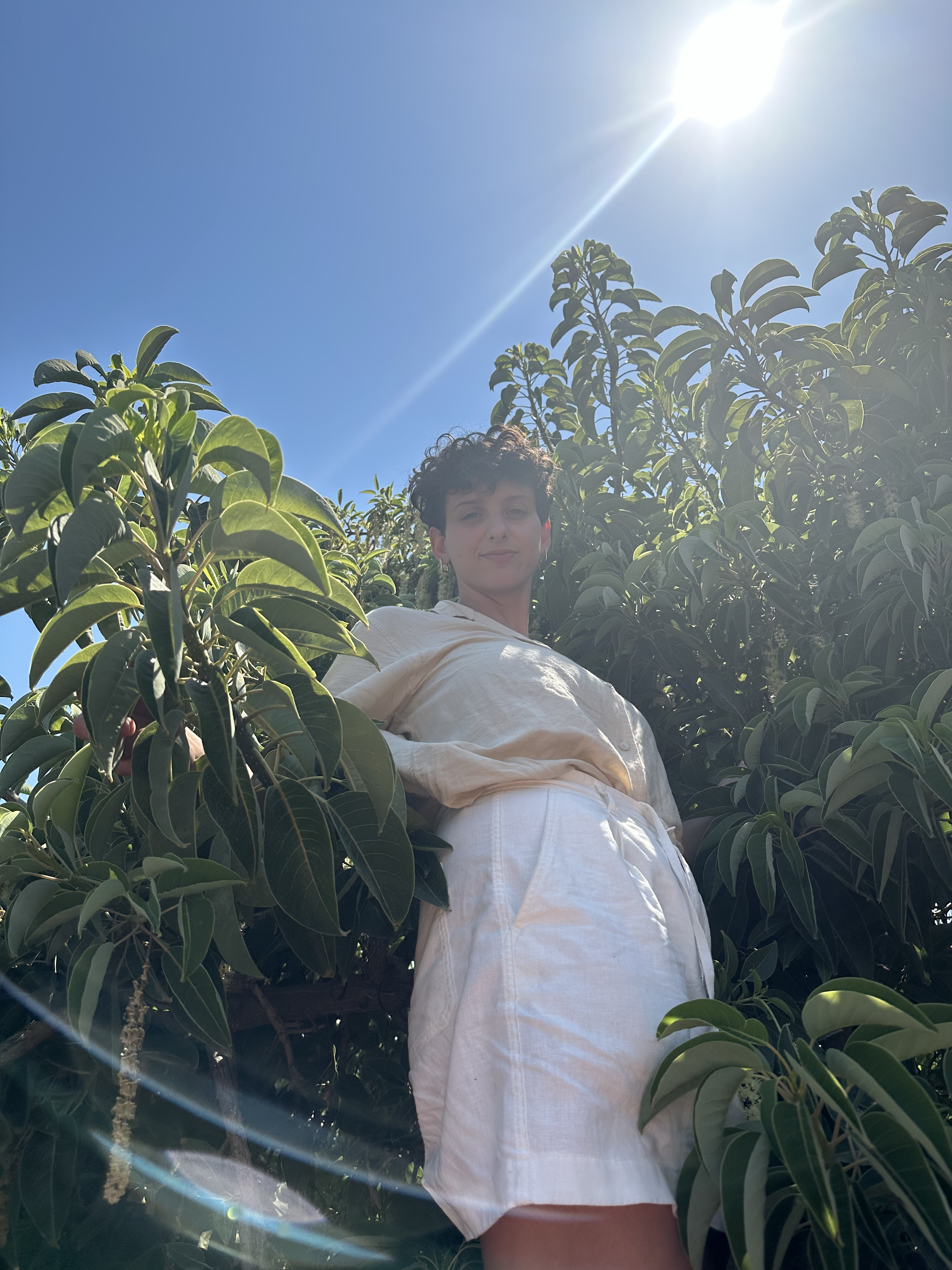Bio
Rae Teitelbaum (they/them) is a visual artist and postgraduate researcher from Syracuse, New York based in Barcelona, working with film, video, performance, installation, poetry, and textiles.
Rae is currently an artist in residence at La Escocesa in Barcelona, Spain and is also currently attending Goldsmiths, University of London, where they are finishing an MPhil/PhD in Visual Anthropology remotely. Rae’s PhD is titled Queer Worlding: Exploring Practices of Co-Creation in Queer and Trans Eco-Communities in Rural Spain and Portugal and involves a written dissertation and the production of a feature-length film, called Starry Earth Bodies, hand-made costumes, and performances, which they developed at Can Serrat, an artist residency in Montserrat National Park in Catalunya. Their research applies embodied, visual, and collaborative qualitative methods rooted in queer, intersectional feminist, and decolonial ethics to understand and participate in practices of queer worlding and the development of experimental ways of living in relation to other humans and more-than-human worlds in the Iberian Peninsula.
Rae studied in both Spain and the United States for their undergraduate degree, graduating from Purchase College with a Bachelor’s of Arts in ‘Media, Society, and the Arts’, an interdisciplinary program that combined fine arts, anthropology, and media studies in 2017. Rae attended Metáfora Studio Arts Programs in Barcelona, where they completed an advanced arts diploma in 2019. Following this, Rae completed a Master of Arts in Digital Media: Image Making at Goldsmiths, University of London, where they focused on 3D video animation, virtual reality, processing, and coding. Rae has exhibited their work at a variety of galleries in Barcelona including Tangent Projects, Homesession, Ángels Barcelona, Espai 2, and Bien Cuadrado as well as internationally.
Rae is currently an artist in residence at La Escocesa in Barcelona, Spain and is also currently attending Goldsmiths, University of London, where they are finishing an MPhil/PhD in Visual Anthropology remotely. Rae’s PhD is titled Queer Worlding: Exploring Practices of Co-Creation in Queer and Trans Eco-Communities in Rural Spain and Portugal and involves a written dissertation and the production of a feature-length film, called Starry Earth Bodies, hand-made costumes, and performances, which they developed at Can Serrat, an artist residency in Montserrat National Park in Catalunya. Their research applies embodied, visual, and collaborative qualitative methods rooted in queer, intersectional feminist, and decolonial ethics to understand and participate in practices of queer worlding and the development of experimental ways of living in relation to other humans and more-than-human worlds in the Iberian Peninsula.
Rae studied in both Spain and the United States for their undergraduate degree, graduating from Purchase College with a Bachelor’s of Arts in ‘Media, Society, and the Arts’, an interdisciplinary program that combined fine arts, anthropology, and media studies in 2017. Rae attended Metáfora Studio Arts Programs in Barcelona, where they completed an advanced arts diploma in 2019. Following this, Rae completed a Master of Arts in Digital Media: Image Making at Goldsmiths, University of London, where they focused on 3D video animation, virtual reality, processing, and coding. Rae has exhibited their work at a variety of galleries in Barcelona including Tangent Projects, Homesession, Ángels Barcelona, Espai 2, and Bien Cuadrado as well as internationally.
Artist’s Statement
Rae Teitelbaum (they/them) is a queer, non-binary visual artist and PhD candidate at Goldsmiths, University of London, where they are studying visual anthropology. Rae’s artistic practice is rooted in film, video, performance, installation, sculpture, poetry, and textiles and primarily is situated within themes of gender, sexuality, SF/worlding, futurity, and ecology, which informs and overlaps with their research in exuberant ways. Rae’s PhD is currently titled, Queer Worlding: Exploring Practices of Co-creation in Queer and Trans Eco-Communities in Rural Spain and Portugal. Rae’s work positions queer worlding both as a collective process, which can involve spiritual, social, ecological practices, imaginaries, and desires, leading to the generation of experimental models of living in relation to other humans, non-humans, and land, as well as a potential radical tool for imagining, worldbuilding, and creating art. Through practices of queer worlding and speculative fabulation, they are primarily interested in the artistic production of queer eco imaginaries, worlds, and future-past-presents. Rae is currently working to develop a feature-length film called Starry Earth Bodies, which combines documentary and ethnographic approaches to filmmaking with a queer, feminist, and decolonial framework, to capture the what is, or what is already taking place in rural queer and trans eco-communities, where their research is located, with the what could be, which, through speculative fabulation, worlding, costume-making, collaborative practices, and performance art. Through the creation of costumes using materials that are biodegradable, recyclable, and/or reusable, primarily raw wool, that they are handwashing and hand-dying, found organic materials and rope, fabric, and chain, the development of performances, and filming, Rae intends to weave together future queer-eco potentialities into the present.
